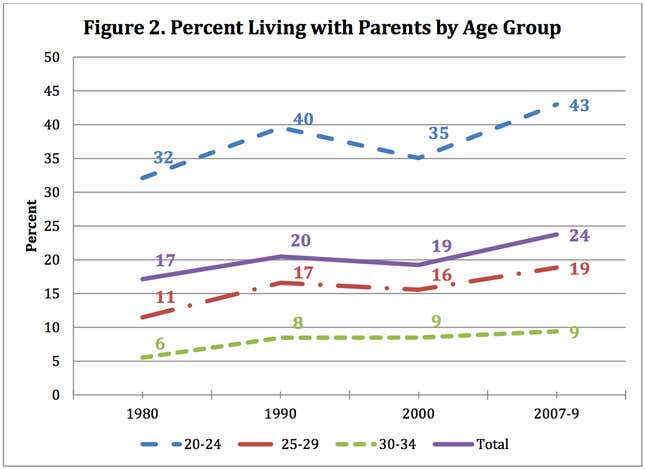New data from Eurostat show the percentage of 25- to 34-year olds living with their parents. The numbers vary wildly from country to country: Your average Slovak, Bulgarian or Greek in that age range is more likely than not to live at the parental home. If you’re a Finn, a Swede, or even a Frenchman, though, the chances are pretty slim, and for Danes it’s almost unheard-of.
By and large, countries with the highest rates of 25- to 35-year olds still living in the paternal nest also have the highest rates of youth unemployment, which makes sense because youth unemployment (youth defined as 15- to 24- year olds) is usually a bellwether for general unemployment.
But the correlation is far from clear. While it’s tempting to conclude that young people move out of their parents’ homes once they find jobs, cultural habits play a large role. Sweden and France had the same youth unemployment rates in 2011, but young French adults are twice as likely as Swedish ones to be living with their parents. Italy and Ireland make a similar pairing. It would seem that Southern Europeans have a harder time letting go of Mom and Dad.
Still, job opportunities clearly play a part. Americans entering adulthood during the Great Recession were “last hired, first fired.” Not surprisingly, unemployment among 18- to 24-year-olds jumped from 12% to almost 20% between 2007 and 2010. And according to a recent study by Zhenchao Qian of Ohio State University, the proportion of young adults living with their parents between 2007 and 2009 was also at its highest in over three decades (see chart below). Moreover, in 2010, new homes were being formed at about 500,000 a year, about the same rate as they were in 1947—when America’s population was half its size.

But as the American employment situation slowly improves (even among youth) the pace of household formation has picked up. Last year, there were 1.2 million new households, indicating that young adults in the US are starting to move out of their parents’ homes. In short, as people get paid, they get a pad.
